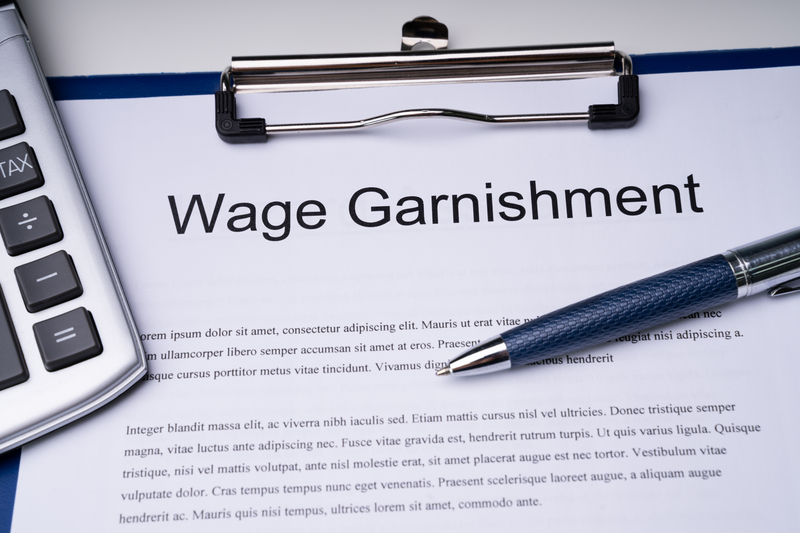
Wage garnishment is among the available options for creditors to recover past-due payments, unpaid loans, and outstanding debts from debtors. It involves withholding a portion of the debtor’s earnings or paycheck by their employer, which will be sent to the creditor. However, wage garnishment requires a court order, and there is a limit on the percentage or amount of your income that may be garnished.
At Geranios Law, PLLC, I have the diligence and skill to advise and guide employees in wage garnishment and bankruptcy-related matters. As a knowledgeable Montana bankruptcy attorney, I can enlighten you about the laws addressing wage garnishment, the amount of your income that can be garnished, and explore your available legal options to stop it. My firm proudly serves clients across Missoula, Bosman, Beaverhead, Madison, Ravalli, Jefferson, Sanders, and Silver Bow Counties, Montana.
Wage Garnishment: What You Need to Know
Wage garnishment is a legal process whereby a court orders a debtor’s employer to withhold part of the debtor’s income in order to pay a creditor or financial obligation. In wage garnishment, the debtor’s employer will deduct a portion of their wages and send it directly to the creditor.
The withheld wages will repay the debtor’s past-due taxes, credit card loans, medical debts, and domestic support obligations, including child support and alimony. The wage garnishment will continue until you fulfill your debt obligations.
Types of Debts Eligible for Garnishment
Some of the most common types of debts that are eligible for wage garnishment include:
- Medical debts
- Child support payments
- Federal student loans
- Spousal support or alimony payments
- State income taxes or back taxes
- Credit card loans and other consumer debts
However, your employer can only withhold a portion of your earning, and not all. An experienced attorney can assess your specific situation and help determine the amount of your income that can be garnished.
How Much Can Be Garnished?
Montana operates using federal wage garnishment laws. Under the law, the creditor may be eligible to garnish the lesser of the following from your paycheck:
- 25% of your weekly disposable income, or
- the amount that your weekly disposable income is more than 30 times the federal minimum hourly wage.
Furthermore, the current federal minimum wage is $7.25. 30 times $7.25 is $217.50. Thus, if you earn $217.50 or less weekly, the creditor will be unable to garnish your wages.
Laws Addressing Wage Garnishment
Here are some federal and state laws addressing wage garnishment:
Title III of the Consumer Credit Protection Act (CCPA)
Here are some vital provisions of the Consumer Credit Protection Act (CCPA) regarding wage garnishment:
- It is unlawful for an employer to discharge or terminate the employment of an employee whose wages have been garnished as a result of any outstanding debt.
- There is a limit on the amount of an employee’s earnings that may be withheld or garnished within a week.
- Title III of the CCPA doesn’t protect employees whose wages have been garnished for more than one debt.
As previously mentioned, Montana follows federal laws addressing wage garnishment. A trusted lawyer can fully explain your rights and explore your different legal options to stop wage garnishment.
How to Stop Wage Garnishment
Meeting your financial needs after part of your earnings have been garnished can be difficult. If you’re facing financial distress due to wage garnishment, here are some possible ways to stop it:
- Fight The Garnishment – You can contest the wage garnishment judgment by filing a petition of exemption with the Montana court.
- Negotiate a Payment Plan – Alternatively, you can contact your creditor to negotiate a suitable repayment plan for you to pay back your outstanding debts.
- File for Bankruptcy – Also, you can file for bankruptcy to stop the wage garnishment and eliminate some or all of your unsecured debt.
Filing for Bankruptcy
Filing for bankruptcy can help you achieve debt relief and stop wage garnishment. Upon filing your bankruptcy petition, an “automatic stay” order will go into effect. The automatic stay is a federal court injunction that prohibits creditors and debt collectors from contacting you, collecting debts, pursuing legal action to recover debts, or garnishing your wages.
The most common bankruptcy options are Chapter 7 and Chapter 13 for consumers in Montana. Chapter 7 will wipe out most of your general unsecured debts and help you achieve a financial fresh start. However, you will still be required to repay student loans, taxes, and domestic support obligations, such as child support and spousal support. A dedicated Montana bankruptcy lawyer can inform you about your debt relief options and help determine your eligibility.
Protect What’s Rightfully Yours
Being unable to pay your outstanding debts may prompt the creditor to seek a court order to garnish your wages. Regardless, you should never accept a wage garnishment decision without a fight. At Geranios Law, PLLC, I’ve devoted my career to providing experienced legal services and helping clients fight their wage garnishment decision.
As your legal counsel, I evaluate your financial situation, decide if bankruptcy is right for you, or explore your other options to stop the wage garnishment. In addition, I will fight intelligently on your side, advocate for your rights and protect what belongs to you, and help negotiate a feasible debt resolution arrangement with your creditor.
Contact me at Geranios Law, PLLC, today to arrange a simple case assessment with a strategic bankruptcy attorney. I have the experienced legal counsel and trusted advocacy you need to stop wage garnishment and achieve financial relief. My firm proudly serves clients across Missoula, Bosman, Beaverhead, Madison, Ravalli, Jefferson, Sanders, and Silver Bow Counties, Montana.



